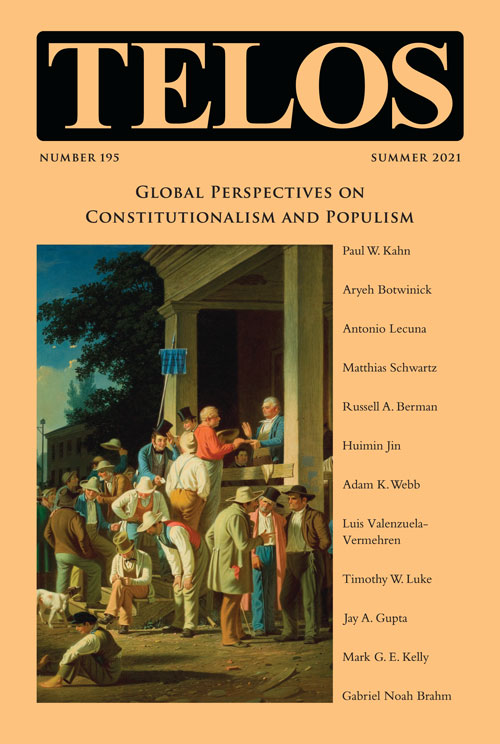In today’s episode of the Telos Press Podcast, David Pan talks with Jay Gupta, Mark Kelly, and Tim Luke about the changing character of the public sphere. Their wide-ranging conversation covers a number of topics, including the ways that social media has fragmented the public sphere into separate echo chambers; how the internet has contributed to an insurgent populism around the world and the efforts by traditional stakeholders to shut it down; the atrophy of the value of truth and the dominance of “bullshit” in the Trump era; the extent to which moral earnestness preserves an aspiration to truthfulness; Trumpism and the critique of society as controlled by unaccountable New Class elites; the ongoing Trumpification of the Republican Party; and the conflation versus the interpenetration of elitism and expertise. Telos 195 (Summer 2021) features a forum on the public sphere with articles by Gupta, Kelly, and Luke, excerpts of which appear here. Read the full articles at the Telos Online website (subscription required). To learn how your university can subscribe to Telos, visit our library recommendation page. Print copies of Telos 195 are available for purchase in our online store.
|
In today’s episode of the Telos Press Podcast, David Pan talks with Adam K. Webb about his article “Supranational Governance and the Problem of the ‘Dignified Constitution,’” from Telos 195 (Summer 2021). An excerpt of the article appears here. Their discussion covers a range of topics, including the difference between the dignified constitution and the efficient constitution, the lack of a dignified constitution in supranational institutions like the EU and the UN, the domination of these institutions by the new class elite, the possibility of a global demos, the opposition of dignified constitutions to technocratic views of government, the insularity of some traditionalist arguments, and the current prospects for a broad global coalition. If your university has an online subscription to Telos, you can read the full article at the Telos Online website. For non-subscribers, learn how your university can begin a subscription to Telos at our library recommendation page. Print copies of Telos 195 are available for purchase in our online store. In today’s episode of the Telos Press Podcast, David Pan talks with Antonio Lecuna about his article “Populism in Venezuela: The Nature of Chavismo,” from Telos 195 (Summer 2021). An excerpt of the article appears here. If your university has an online subscription to Telos, you can read the full article at the Telos Online website. For non-subscribers, learn how your university can begin a subscription to Telos at our library recommendation page. Print copies of Telos 195 are available for purchase in our online store. Telos 195 (Summer 2021): Global Perspectives on Constitutionalism and Populism is now available for purchase in our store. Individual subscriptions to Telos are also available in both print and online formats.
In today’s episode of the Telos Press Podcast, Camelia Raghinaru talks with Michael Millerman about his article “The Ethnosociological and Existential Dimensions of Alexander Dugin’s Populism,” from Telos 193 (Winter 2020). An excerpt of the article appears here. To learn how your university can subscribe to Telos, visit our library recommendation page. Print copies of Telos 193 are available for purchase in our store. In today’s episode of the Telos Press Podcast, David Pan talks with Jay Gupta, Mark G.E. Kelly, and Timothy W. Luke about the U.S. Capitol riot on January 6, 2021. Their discussion covers a range of topics, including the main causes of the riot, the cultic character of Trump’s supporters, whether the breach of the Capitol was more about symbolism or substance, the declining legitimacy of U.S. political institutions and the loss of faith in the Constitution, the rhetoric of democracy, populism as a rebellion against the administrative deep state and managerial capitalism, the changing politics of race and racial divides, and the realignment of Democratic and Republican coalitions in the wake of Trump. Telos 194 (Spring 2021) features a group of essays on the U.S. Capitol riot, excerpts of which appear here. Click through to read the full articles at the Telos Online website (subscription required). To learn how your university can subscribe to Telos, visit our library recommendation page. Print copies of Telos 194 are available for purchase in our store. |
||||
|
Telos Press Publishing · PO Box 811 · Candor, NY 13743 · Phone: 212-228-6479 Privacy Policy · Data Protection Copyright © 2025 Telos Press Publishing · All Rights Reserved |
||||



